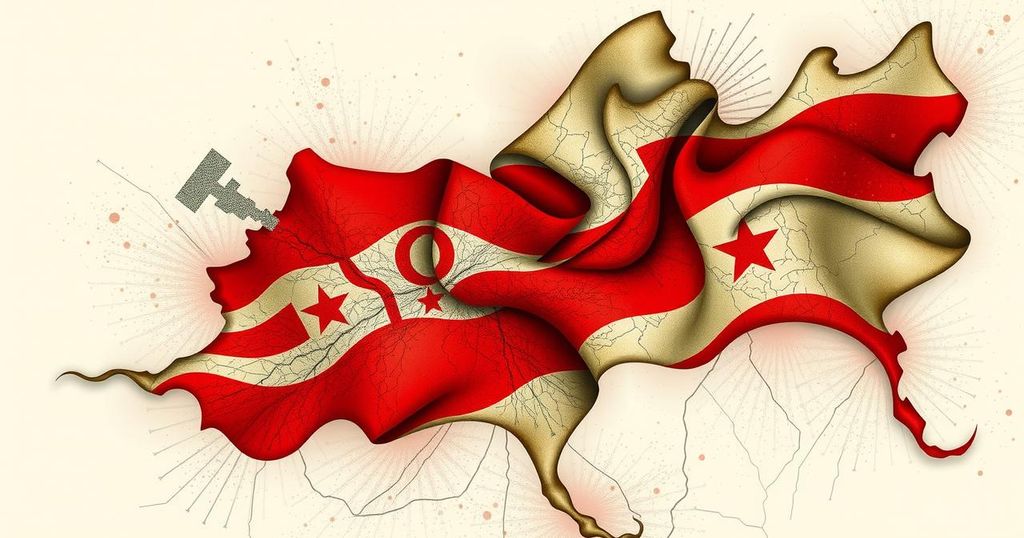The article explores the experiences of Syrian families navigating the border between Lebanon and Syria amid ongoing conflict and political upheaval. It captures personal narratives of loss, resilience, and the struggles between safety and belonging as individuals weigh the prospects of returning home against the risks they face. Through the lens of emerging local leadership and the haunting memories of war, the complexities of migration and identity are poignantly illustrated.
In a border region between Lebanon and Syria, families are seen crossing freely, embodying the ongoing complexities of migration and safety amid ongoing political turmoil. Syrian individuals await transportation back to Lebanon after facing increasing threats in their homeland, while others return to search for lost relatives. The border area showcases contrasting realities, where former residents navigate feelings of nostalgia and insecurity amid shifting power dynamics marked by the rise of local leaders such as Ahmed al-Sharaa, previously known as Jolani. Amidst this oscillation, personal stories of loss, resilience, and the haunting memories of a brutal civil war reveal the human cost of political strife.
Asa’ad Zain al-Deen, a former resident who fled Syria after losing family members to the regime, illustrates the challenges faced by those reconsidering their homeland in light of the rise in hostilities and the uncertain future offered by new local governance. He reflects, “Maybe we’ll come back to Syria,” as he weighs the balance between past attachments and pressing safety concerns for his family.
Similarly, Anas Mazloum’s search for his brother, who was last reported alive in a notorious prison, underscores the personal tragedies that resonate throughout these communities. The arduous quest to find loved ones persists even as Mazloum notes, “I will search for him for the rest of my life,” highlighting the enduring hope that persists amidst despair.
The emerging landscape in Syria reveals mixed sentiments among its citizens. While some view the new leaders with cautious optimism, others fear that the initial liberation could lead to renewed sectarian tensions. Khalil Abed al-Nabi articulates this duality, stating, “We are not like that,” addressing misconceptions regarding the motivations of those now in power.
As the region grapples with the past while looking toward the future, those caught in the middle continue to confront the stark choices between remaining in a tumultuous Syria or seeking the security of Lebanon, where they too face discrimination and uncertainty. The fragmented stories of returnees like Deen and Mazloum encapsulate persistent struggles for safety, identity, and belonging ingrained in the current socio-political fabric of the region, shedding light on the critical need for dialogue and understanding as the situation continues to evolve.
The ongoing conflict in Syria has led to millions of refugees fleeing to neighboring countries, notably Lebanon, where many face discrimination and precarious living conditions. The article explores the harsh realities faced by these individuals as they decide whether to return to their war-torn homeland or remain in foreign territories, emphasizing the emotional and psychological impacts of such decisions. The emerging power dynamics under local leaders like Ahmed al-Sharaa, formerly associated with extremist factions, have significantly altered the landscape in Syria, prompting mixed reactions from the populace. As these individuals navigate through a no man’s land, the complexities of loyalty, fear, and hope come to the forefront of their experiences.
The article intricately outlines the ongoing human consequences of the Syrian civil war, emphasizing the personal narratives of individuals navigating treacherous political landscapes. It highlights the challenges faced by displaced families, their hopes for safety and reuniting with loved ones, all while confronting a grim reality dominated by shifting allegiances and past traumas. The ongoing discussions around governance, safety, and discrimination reflect the broader societal dilemmas prevalent in the region. Ultimately, the stories of Asa’ad Zain al-Deen, Anas Mazloum, and others reveal the delicate balance between hope, past grievances, and an uncertain future as they seek to carve out a semblance of normalcy amid chaos.
Original Source: www.newyorker.com






